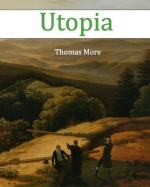themselves with the fancy of their nobility, and are
pleased with this conceit—that they are
descended from ancestors who have been held for some
successions rich, and who have had great possessions;
for this is all that makes nobility at present.
Yet they do not think themselves a whit the less noble,
though their immediate parents have left none of this
wealth to them, or though they themselves have squandered
it away. The Utopians have no better opinion
of those who are much taken with gems and precious
stones, and who account it a degree of happiness next
to a divine one if they can purchase one that is very
extraordinary, especially if it be of that sort of
stones that is then in greatest request, for the same
sort is not at all times universally of the same value,
nor will men buy it unless it be dismounted and taken
out of the gold. The jeweller is then made to
give good security, and required solemnly to swear
that the stone is true, that, by such an exact caution,
a false one might not be bought instead of a true;
though, if you were to examine it, your eye could find
no difference between the counterfeit and that which
is true; so that they are all one to you, as much
as if you were blind. Or can it be thought that
they who heap up a useless mass of wealth, not for
any use that it is to bring them, but merely to please
themselves with the contemplation of it, enjoy any
true pleasure in it? The delight they find is
only a false shadow of joy. Those are no better
whose error is somewhat different from the former,
and who hide it out of their fear of losing it; for
what other name can fit the hiding it in the earth,
or, rather, the restoring it to it again, it being
thus cut off from being useful either to its owner
or to the rest of mankind? And yet the owner,
having hid it carefully, is glad, because he thinks
he is now sure of it. If it should be stole,
the owner, though he might live perhaps ten years after
the theft, of which he knew nothing, would find no
difference between his having or losing it, for both
ways it was equally useless to him.
“Among those foolish pursuers of pleasure they
reckon all that delight in hunting, in fowling, or
gaming, of whose madness they have only heard, for
they have no such things among them. But they
have asked us, ’What sort of pleasure is it
that men can find in throwing the dice?’ (for
if there were any pleasure in it, they think the doing
it so often should give one a surfeit of it); ’and
what pleasure can one find in hearing the barking
and howling of dogs, which seem rather odious than
pleasant sounds?’ Nor can they comprehend the
pleasure of seeing dogs run after a hare, more than
of seeing one dog run after another; for if the seeing
them run is that which gives the pleasure, you have
the same entertainment to the eye on both these occasions,
since that is the same in both cases. But if
the pleasure lies in seeing the hare killed and torn
by the dogs, this ought rather to stir pity, that a




